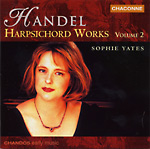After listening to the first suite of this Handel recital by Sophie Yates, I was prepared for a mixed bag. How could Yates begin the piece with such a relatively dull, nondescript performance of the prelude and then conclude with one of the most memorably romping gigues ever afforded the movement? (Of the five recordings of this work in my collection, only Blandine Verlet’s account steps higher.) Further listening revealed similar inconsistencies. For instance, when rendering many of the slower, more elegant passages Yates often becomes quirky at the expense of the musical line. Her relatively monochromatic treatment of the Sarabande of Suite No. 4 for example offers little of the fluency that Scott Ross and again Verlet convey in their performances. This is especially perplexing when only moments earlier–in the Allemande of the same suite–Yates performs beautifully.
Yates certainly is an accomplished performer, and whether or not certain details of her performances are better or worse than other accounts of this admittedly non-interpretive music shouldn’t deter anyone from these overall solid readings. (These suites primarily served Handel as studies from which to fashion larger works; perhaps the most famous instance here is the Presto from the Third suite that the composer later orchestrated as an Allegro for his Op. 3 No. 6 concerto grosso). Not unlike Paul Nicholson in his traversal of these suites for Hyperion, Yates’ inconsistencies have more to do with straightforwardness rather than with any serious lack of incisiveness or interpretive prowess.
Chandos’ sound is fine, with the harpsichord set in a believably shallow, distant acoustic space. Yates’ informative and entertaining notes include many anecdotes, one of which attributes Handel’s original inspirational debt for these suites to Rameau in particular and the French style in general. Listeners inclined to hear the full impact of this influence would do well to consider Verlet’s account on Astrée, as well as those by Ross and Olivier Baumont, both on Erato.
































